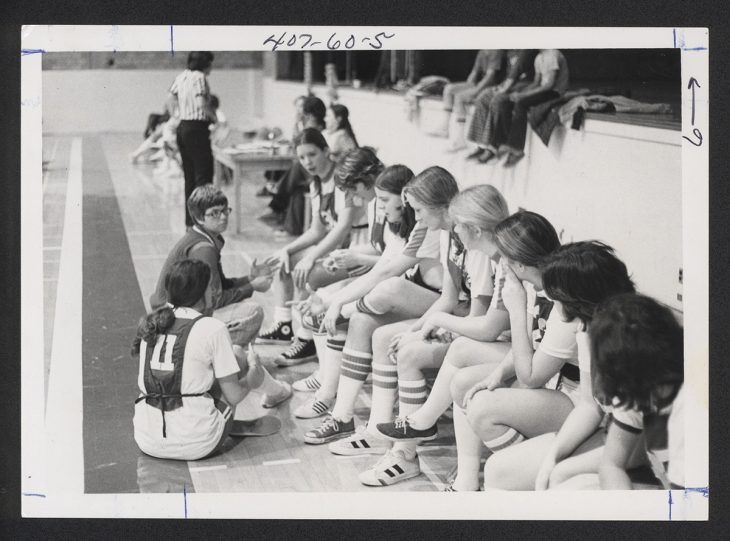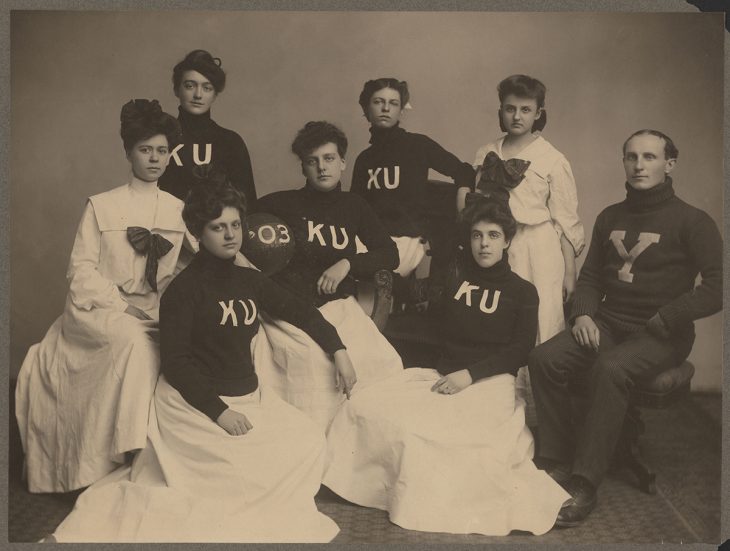
This article appeared in the most recent issue of Transylvania’s Third & Broadway magazine.
Loyal Transylvania University sports fans are used to seeing their favorite teams recognized for national rankings and conference championships year in and year out. Whether it’s last season’s transcendent 27-1 women’s basketball team or a fourth-straight conference title for the women’s lacrosse team, or top-10 national rankings for the volleyball and softball teams and three All-American women triathletes — female Pioneers have been some of the strongest leaders of Transy’s recent athletic successes.
Fifty years after the passing of Title IX legislation in 1972, women’s intercollegiate athletics at Transy are producing athletes and coaches like never before in school history. Like at pretty much every other university in the country, progress in those 50 years has been at times slow and frustrating, but today Transy has more women’s sports and more women athletes than ever before, with seemingly no limit to how much they can achieve on the field of competition.
It’s actually been 120 years since Transy first fielded a women’s basketball team. The 1902-03 squad debuted back when Transylvania was known as Kentucky University. They played one game against State College of Kentucky (you might know that school by its current name — the University of Kentucky), losing the contest but ultimately setting the stage for what was a fairly dominant (approximate) 68-26 record over the next 26 seasons, including an 8-0 state championship season in 1922-23. Unfortunately, the team disbanded in 1930 and lay dormant for the next 40 years.
As an undergraduate at the University of Kentucky in the 1950s, Pat Deacon also didn’t have any official intercollegiate women’s teams she could join, despite being a remarkable athlete. Her only outlet for competing was through the physical education department, which occasionally organized games against other schools. So she took every opportunity to play basketball and field hockey whenever one of those unofficial contests arose.
Perhaps that’s why, when she arrived at Transylvania in 1970 to revive the women’s basketball program, she fought so hard to make that team as competitive as possible, demanding better funding and teaching the sport to women who — pre-Title IX — had very little high school experience. Her first team compiled a 9-1 record in a year where they wore unbranded gym suits and had to bring their own official to the games.
“When I started, the women only had three sports — tennis, field hockey and basketball,” Deacon says. “Now there are 17 sports for women; it’s unbelievable.”

Coach Pat Deacon on the sidelines in 1975
Over her 17 seasons as head basketball coach, Deacon continued to improve the program, culminating with the 1986-87 team that finished 21-6 and won the Kentucky Women’s Intercollegiate Athletic Conference championship. She also coached the field hockey team for 28 seasons, amassing eight conference championships and a 98-55-3 record.
“We won more tournaments in field hockey than we did basketball,” she says. “When I took over the hockey program, most of the girls had never played. They came to Transy to play basketball. I would suggest they come out to field hockey and try it. Even to this day I have former players say that was the best decision they made.”
Now at age 87, Deacon still keeps a close eye on Transy athletics, staying in contact with the program while spending her free time riding her bike 75 miles per week and competing in international table tennis tournaments (she took home a bronze medal in her most recent one, nearly knocking off the Canadian team for silver).
“Pat Deacon has been a real inspiration to a lot of the women coaches here,” says Holly Sheilley, Transy’s vice president of athletics and director of athletics. “She’s given a lot to the university. We have more women competing right now, and more women’s sports than we’ve ever had. That’s been on the shoulders of people like Pat Deacon.”
Deacon’s legacy continues with current women’s coaches like head basketball coach Juli Fulks, who, in addition to making Transy’s program one of the best in the nation, has encouraged her players to go on to careers in coaching, with several of her former players working as assistant coaches and graduate assistants at universities like Boston College, the University of Tulsa, Sarah Lawrence College and Centre College.
“Everything is easier when you see it,” Fulks says. “Whether it’s women going into athletics, engineering, medicine — when you know it’s a possibility, that opens doors and thought processes. I think anytime when we can see a female being successful, that just helps open everybody’s eyes to these potential opportunities, and that matters.”
Head volleyball coach Amy Barmore — who also has former players coaching at schools like the University of Chicago and Ithaca College — points to Sheilley’s leadership as an enormous catalyst for the current state of the women’s programs. Whether it’s finding funding for her team to travel nationally or encouraging her to stay active coaching local club teams, Barmore feels rich support from her leader and mentor.

“She’s all about professional development — whatever we want to do, we pitch it to her and she says go,” Barmore says. “She’s given me the opportunity to grow as a person and a coach. She’s been an awesome mentor and one of the best bosses I’ve ever worked for.”
Sheilley knows that there’s still an uphill battle for women in athletics around the country and why it’s so important for programs like Transy to help women find their way in the field, athletically and professionally. Unbelievably, she notes there are actually fewer women in athletics coaching and administration than there were when Title IX legislation passed in 1972.
A three-sport athlete at Asbury College in the ’90s, Sheilley went straight into a career in athletics, earning four Coach of the Year honors in softball and volleyball at Lindsey Wilson College before being hired at the University of Louisville as assistant athletic director for championships and student development, then assistant director for championships with the NCAA.
At Asbury, she played for coach Rita Pritchett, who had earned the distinction of being the first female collegiate athletic director in the state of Kentucky in 1989. Nearly 25 years later, when Sheilley came to Transylvania as athletic director, she became just the third.
“Rita was the first female coach I ever had,” Sheilley says. “I didn’t even know women could do that, as silly as that sounds. She spent energy and time with all of the female athletes, explaining what Title IX was, why it was important. She said, ‘It’s your time; I need you to carry this forward.’ I felt like she was saying that we’re only going to go as far as the next generation is willing to go with this.”
It’s why she speaks with pride of female Pioneer student-athletes who go into sports as a career, using their liberal arts education and competitive experience to make a difference in the lives of more young women.
“I hope the special part about Transy is we champion women, and we want you to know that there are so many things you can do as a female, whether you spend the next 40 years in sports, or in business or as a mother,” she says. “Whatever it is, I want you to know that you’ll have the tools you need to be successful at it.”
Sheilley regularly brings in women leaders from inside and outside the athletics profession to speak with and help mentor student-athletes to let them see the possibilities that are out there for them. Fulks started a program where she has local female guest coaches participate in game prep, sit on the bench during the game and speak with her team. Recent guests have included Valvoline CFO Mary Meixelsperger; president of Toyota Motor Manufacturing, Kentucky, Susan Elkington; and Gratz Park Private Wealth president Sherry Holley ’88, a member of Transy’s Pioneer Hall of Fame.
“When they come and meet with our team, they tell stories that are very similar to our players’ undergraduate stories,” Fulks says. “I want our players to see what they can go on and do. They can dream big; they can be these people.”
It all goes back to Transy’s mission of educating the whole person, of offering an education that will help them break boundaries and set off on their own successful journeys.
“You get to learn the leadership, communication and accountability — everything that goes into the coaching world,” says Barmore. “It relates to everything I preach to them as student-athletes. To see them grow and be leaders and mentors when they leave Transy is cool to see.”

